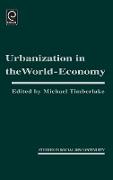- Start
- Urbanization in the World Economy
Urbanization in the World Economy
Angebote / Angebote:
To date, most interpretations of urbanization have focused on the internal dynamics of regions or nations, or at best on narrow relations of international dependency. This text recognizes a complementary world-system process theory. The intent is not to argue that world-system processes totally determine urban change, but rather that patterns of urbanization within regions cannot be adequately understood without at least taking global political economic processes into account.The book begins with a discussion of how a world-system theory of urbanization differs from other approaches. This is followed by a discussion of theoretical issues involved in the world-system approach. The final section of the book consists of empirical studies which use this theoretical perspective to shed light on urbanization patterns either within selected countries or globally. The main themes which are examined include urban primacy and city systems, urban labor force patterns, over-urbanization, and rates or levels of urban concentration.This book contains a review of urbanization literature and discussion concerning the informal labor sector in peripheral areas, core-peripheral relations at the global level, urban primacy theory and its critique, and recent patterns of labor force structure in the world economy. The effects of the mobility of capital and labor on U.S. cities are reviewed and a comparison between the urban systems of South Korea and the Philippines is made. The authors present data on city-size hierarchy at the world level for the past 1000 years and find that changes in the world city-size distribution correspond to cycles in the world system. They conclude that regional studiesand global analyses support interpretations of urbanization using the world-system paradigm.From the Preface: The processes of urbanization have long been regarded as integral to socioeconomic development. However, scholarly opinion about global urban patterns is div
Folgt in ca. 15 Arbeitstagen




